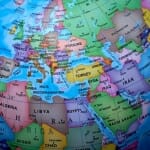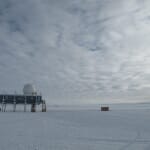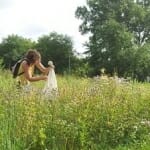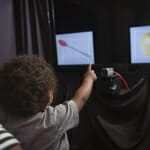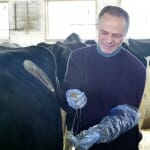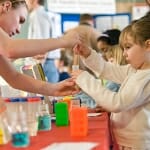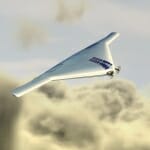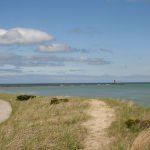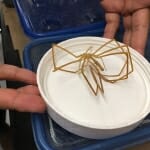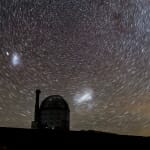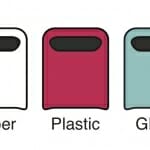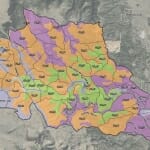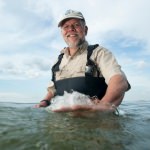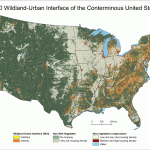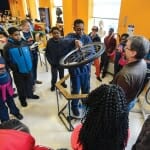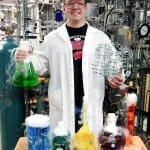Category Science & Technology
How talking more can make you better at listening — to foreign languages
The typical foreign language class spends much of its time listening to fluent speakers, but new UW research shows that the students should spend more time talking.
Snowfall patterns may provide clues to Greenland Ice Sheet
A new UW–Madison study describes a unique method to measure snowfall on the Greenland Ice Sheet that could help answer some key questions.
Grad student researches native bee habitats in urban areas
In surveying Madison’s native bee populations, Vera Pfeiffer hopes to provide a better, more informed context for policies that can make the habitats we share with pollinators more biodiverse.
26 UW–Madison students awarded prestigious NSF fellowships
The NSF fellowship program selects high-potential scientists and engineers in the early stages of their careers, providing awardees with support for graduate research training in STEM fields.
Waisman Center welcomes a center leader to director position
Qiang Chang, a longstanding member of the University of Wisconsin–Madison Waisman Center’s leadership team, has been named the new director of the center following a nationwide search.
Researcher follows dairy cows’ carbon footprints from barn to field
A study by UW–Madison dairy scientists, engineers and agronomists to see how a cow’s breed and forage consumption affect the greenhouse gases generated by her gut and her manure.
Science Expeditions welcomes public to campus April 6–8
For three days this weekend, you can dive beneath the waves to explore shipwrecks in the Great Lakes, search for ghostly particles using a billion tons of ice and discover how we might grow food on Mars.
UW Sea Grant Institute awards $2.8 million in research grants
The University of Wisconsin Sea Grant Institute—which is dedicated to the sustainable use of Great Lakes resources through research, education and outreach — has announced the award of $2.8 million in research dollars for 2018-20.
Spiders and scorpions have co-opted leg genes to build their heads
New research shows that the common house spider and its arachnid relatives have dispensed with a gene involved in creating segmented heads, instead recycling leg genes to accomplish the task.
Liquid-to-glass transition process gains clarity
While a combination of trial and error and scientific research helped refine glassmaking processes over time, controlling the creation of metallic glasses at the atomic level remains an inexact endeavor. “Our job,” says Paul Voyles, “is to build fundamental understanding by adding more data.”
When communicating with color, balance can be a path to accuracy
UW-Madison Researchers found that the best colors to use for waste bins are shades of white for paper, red for plastic, pale blue-green for glass, dark grey for metal, dark green for compost, and black for trash.
UW professor leads national study on effectiveness of mentoring in STEMM
The National Academy of Sciences study focuses on undergraduate and graduate mentoring of individuals traditionally marginalized in STEMM.
UW-Madison expands GIS professional programs to meet workforce needs
With demand spiking for GIS experts, the University of Wisconsin–Madison is significantly expanding its flexible and accelerated GIS programs for busy working professionals.
‘Free-range scientist’ Steve Carpenter remains inspired, inspiring — even in retirement
It’s been nearly six months since he officially stepped down as director of the UW–Madison Center for Limnology, but there's still much science left to do.
More homes built near wild lands leading to greater wildfire risk
New research out of the University of Wisconsin–Madison shows that a flurry of homebuilding near wild areas since 1990 has greatly increased the number of homes at risk from wildfires while increasing the costs associated with fighting those fires in increasingly dense developments.
Ingersoll Physics Museum celebrates 100 years of hands-on education
Last year, more than 14,000 visitors came to the free museum to spin bicycle-wheel gyroscopes, crank electrical generators, and yank on pulleys.
Better solvents = better biomass conversion for biofuels and bioproducts
UW-Madison researchers are pushing for a broader understanding of solvents used to convert non-food biomass to biofuels and bioproducts, which would help them to optimize biomass conversion reactions.

